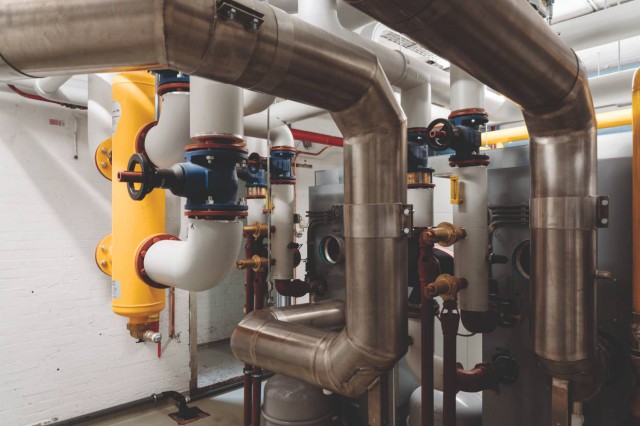Joined-up thinking – the key to success

Better collaboration between system designers, specifiers and contractors is essential for ensuring the optimum health of heating systems.
Specifying the right products for the right applications is essential to the long-term health of new buildings or renovations. Key to this is the cooperation between specifiers and contractors; ensuring that what’s outlined in the planning stage is actually carried out at the build stage, and that all parties involved in building and maintenance understand how to properly manage it to ensure optimum health and efficiency.
When it comes to designing an effective heating system, the key to getting it right requires specifying a mix of the right equipment to do the job, a thorough understanding of the technology and its application, as well as sufficient knowledge and care during installation.
Where heating systems are concerned, though, this sadly is too often not the case. Rather than understanding why certain products have been specified, contractors will frequently strip out essential kit in favour of - often cheaper - alternatives. This usually occurs when they have under-priced a particular project and are looking for ways to bring it back within the budget, or perhaps do not appreciate that the particular product chosen for the job was far superior to some of the other products on the market that looked like they would be okay!
However, thankfully, the key component – the boiler – is rarely sacrificed. Rather it’s the additional elements, which are key to long-term health that is either replaced or removed without consideration as to what role these elements play in the overall system health.
When setting up any system, a number of key factors need to be taken into account including pressurisation, correctly sized expansion tanks and hydraulic balancing. If these are miscalculated, then malfunctions become pre-programmed, inefficiency is in-built and breakdowns are almost inevitable, even if not immediately apparent.
The removal of dirt and air separators is far too common, despite the fact that good quality products – like Spirotech’s range - will safeguard against the costly breakdown of boilers and other system components by preventing the build-up of dirt and air.
To avoid issues like this persisting, it’s key for all parties to understand the various stages of design, commissioning and installation, and how each one is interconnected.
The specifier and engineer may be very knowledgeable and understand all the key principles of design and installation, but if the value engineer or contractor chooses to strip out what they consider to be ‘unnecessary’ extras, then all the hard work can be quickly undone.
In many cases, the contractor is only obliged to carry out maintenance for two to three years after completion, so once this period is up, they have no responsibility for the long-term health of the building. As such, when a contractor decides which heating system to opt for, there’s little incentive for them to specify a product that will ensure the system will not become clogged with dirt and air and one that isn’t reliant on inhibitors.
As the market moves increasingly towards becoming more sustainable, by investing in energy-saving technologies to reduce carbon footprints, the quality of the fluid within systems becomes ever more important – in fact, water is the single most important ‘component’ within the system. Get its conditioning right, and it will reward the system’s designer, installer, maintenance engineer, or end-user with efficient, trouble-free operation.
From a technological standpoint, very little can be done to improve the efficiency of modern boilers, so in order to maximise energy efficiency end users have to look at how system water can play its role in ensuring boiler efficiencies are kept at optimum levels. By not considering the impact of the build-up of air and dirt on modern boilers, systems simply cannot run at full capacity or meet their efficiency potential.
This insistence on cost cutting, or a lack of joined up thinking between designers and contractors, makes little sense in practice. Spending £100,000 or more on a top-of-the-range new boiler is not uncommon, yet to consider the relatively modest sum needed to safeguard systems from air and dirt as a luxury, rather than an integral part of the system, is short sighted.
In the past, dirt particles were tackled primarily through the use of dosing with chemicals and utilising automatic air vents (AAVs) to release free air. It is now widely recognised that removing air from system water negates many of the problems that can impact a system’s performance and is a vital part of the maintenance regime.

Failure to remove air will lead to corrosion and oxidisation and the creation of dirt, specifically magnetite, affecting flow dynamics and the system’s efficiency, increasing energy consumption.
Not removing dirt and air only serves to build in problems for the longer term, and the expensive investment in good-quality, high-efficiency boilers and other system components is wasted if steps are not taken from the outset to protect the system, resulting in on-going maintenance problems.
Some problems are more obvious than others. These include kettling in the boiler due to pump inefficiency, leaking AAVs, noise in pipes and radiators, and reduced heat transfer.
In many buildings, it is equally important to ensure that budgets are well controlled and used to maximum effect, as it is to deliver comfort to the occupants of the building. Consequently, it’s often less the case that a product has been removed from a plan, but instead altered or amended, usually in an attempt to reduce cost. One area where such alterations are made is the choice of expansion vessel size. In fact, many errors in installation and associated problems come about as a result of the wrong choice of vessel and/or the incorrect sizing of connecting pipework.
In many cases, the vessel is undersized for the requirement so is unable to perform at optimum levels. The acceptance factor is what dictates the size of the vessel and the final pressure on the system; if the vessel is not large enough to meet the need, then the pressure around the system will be inaccurate and the system installed will not function properly.
Cost is still a major factor in many decisions on what product is installed, so what the industry needs is for specifiers or consultants to be bolder and insist that the products being installed are right for the long-term health of the building, not the cheaper poorer performers that will only save money in the short term. Making the right decision involves looking into the potential future needs of a building – having the additional capacity incorporated into a system can save many thousands of pounds in the long run.
System health will be greatly improved once the disparity between the design phase, consultant recommendation, hand-over to the lead contractor, and the company tasked with the on-going maintenance, is ironed out and there’s a greater acknowledgement that the products initially specified are done so for the good of the building and its most valuable assets.
Rounding off the process is also vital. A simple post-installation briefing with management teams can often save tens of thousands of pounds in unnecessary call outs, costly inhibitors or component malfunctions, as well as help facilities managers gain greater insight into how the systems work and, importantly, who to call if advice or guidance is needed.
Given today’s high prices being paid for energy, it is prudent for all businesses to look at the efficiency of their heating systems and ensure routine maintenance is carried out at regular intervals.
Steve Simmonds is Special Projects Engineer at Spirotech







